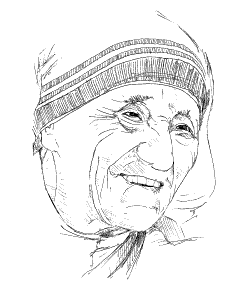![[ OPINIONS ]](/images/fall97/opinionsf97.gif)
![]()
Mother Teresa of Calcutta, 1910 1997
![[photograph]](04_3_i.gif)
Chris Badeaux |
By Chris Badeaux
Arizona Daily Wildcat September 8, 1997
Mother Teresa died Friday. The world is a darker place. Ordinarily,
this is the part of the editorial where I'd try to get a laugh with some
bit of sarcasm. Not this time. To honor a woman who lived a life of practical
simplicity, I'll keep this short and to the point.
Mother Teresa, whose future canonization is as certain as the sunrise, lived a life of faith, good works, poverty, and charity in a world where such ideas are the subject of at least as much contempt as respect.
Born Agnes Goinxha Bejaxhiu in 1910 in Skopje, Yugoslavia, she became a nun 18 years later and shortly thereafter traveled to India, where she took the name Teresa after St. Theresa of Avila. In 1946, she felt called to work with the poor, and in 1948, she founded the Missionaries of Charity, an order of nuns dedicated to helping what many called the "dregs" of society.
Mother Teresa, you see, realized something that most of us are slow to pick up on: The little things count. The little things eventually become big things. Feeding one starving child leads to feeding many, which leads to helping the dying, the destitute and eventually everyone else.
She was conservative in the best sense of the word she harkened back to the fundamentals of Christian charity and love.
She established a leper colony in India and spent her career working with and helping the very poor. Rather than continuing the tradition of European colonialism in India, she became an Indian citizen and learned the language of her patients. She treated and helped anyone, no matter their faith or lack thereof, without criticism or complaint. Her missionary work was done by example, not by word; by humility, not by arrogance.
She viewed her reception of the Nobel Peace Prize in 1979 as an honor, but one in due perspective; she gave the prize money to her shelters, and asked that the money usually allocated for the prize banquet be used to feed the local homeless.
Her courage was no less than her charity. Her determined stances on abortion, population control and the "tough-love" approach to poverty (that aiding the poor only perpetuates poverty) left her open to a great deal of criticism; not once, though, did she waver. When she felt that someone, be he president, king or pope was out of line, she was very quick to point it out.
Those kings, presidents, prime ministers, generals and popes listened when Mother Teresa spoke. She did not carry the sort of power that orders men to their deaths, but was rather given to the kind of whisper that made those same men hold their breaths to listen.
What I have written here is hardly a fit elegy. Virtually nothing I, or indeed, the world can say could come close to celebrating the simple wonder that was this woman's life. Where others lived in rage or hate, she brought love. The only real remaining tribute to this woman lies in the refuges for the poor and ill which she established, and in our memory of her.
So, in closing, I'd like to say this. Just for a day, try acting like Mother Teresa. It doesn't matter whether you're Catholic or not, Christian or not, religious or not. The little things will do hold your temper if someone cuts you off in traffic; if someone on the street asks you for a quarter and you have a dollar, give the dollar; heck, just hold the door for someone on the way into or out of a building.
The little things are how Mother Teresa got started.
Chris Badeaux is the Perspectives Editor. He thanks Fr. Fred for "the little things" part.




